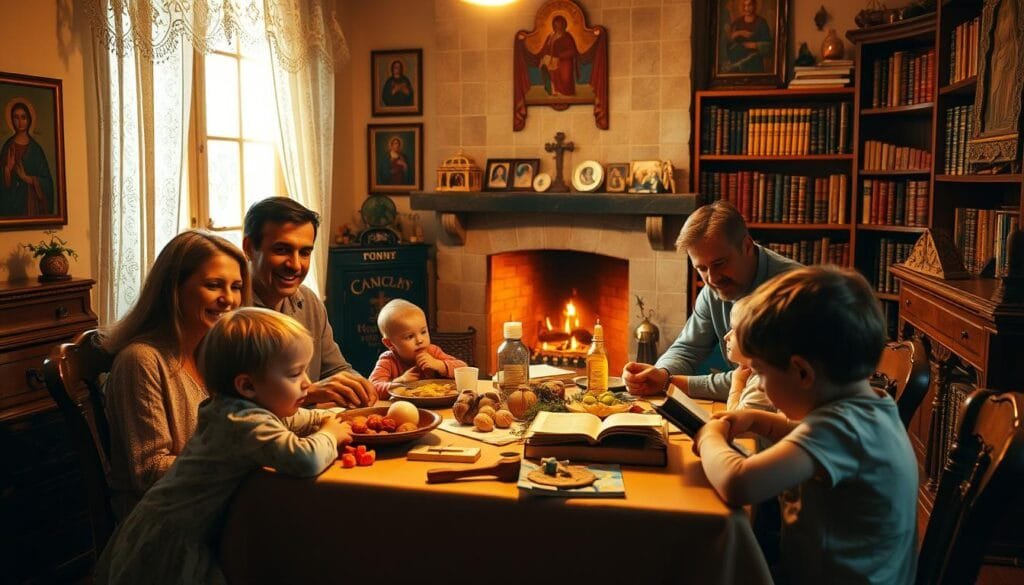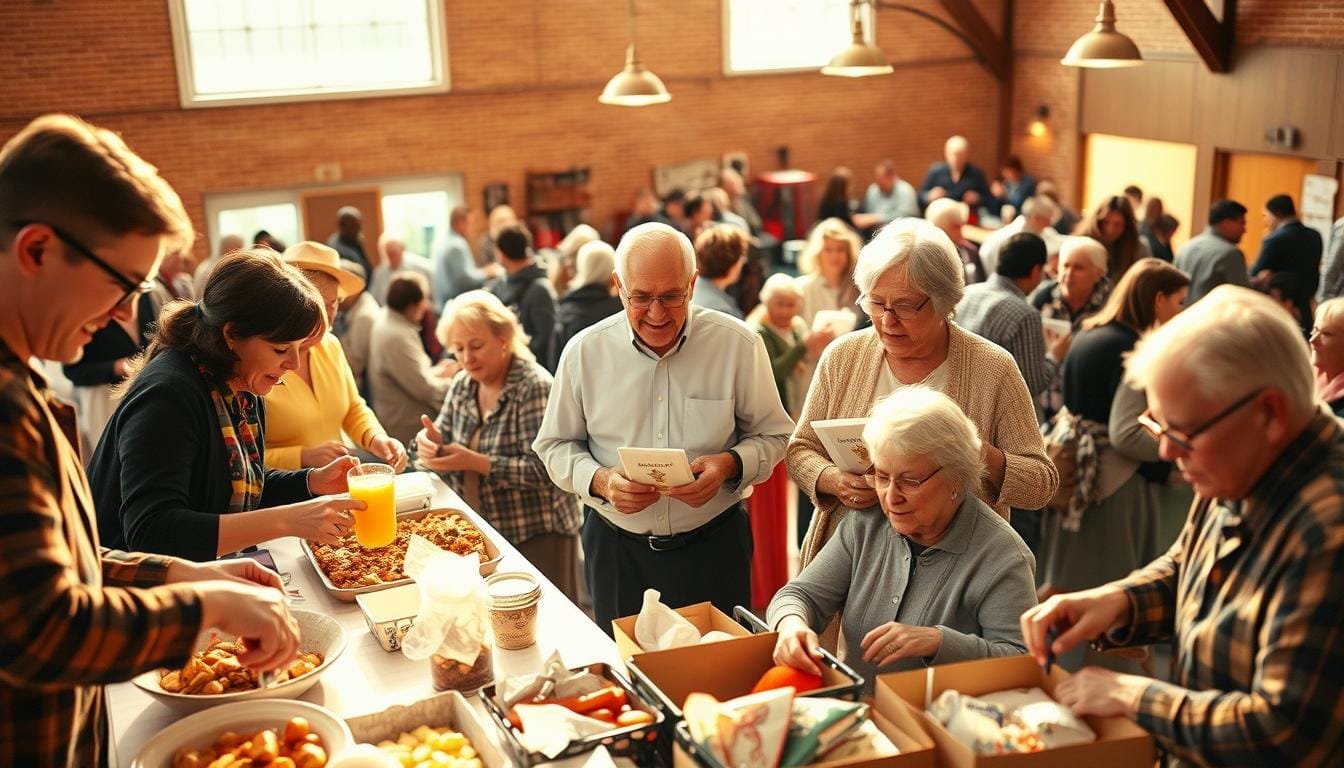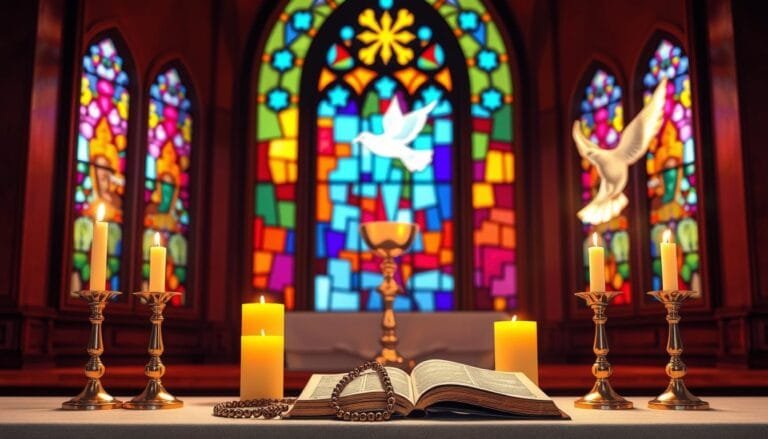The Vocation of Catholic Laity
This website contains affiliate links. As an Amazon Associate, I earn from qualifying purchases. The content on this website was created with the help of AI.
In a world that often defines purpose by career or status, Catholics are called to something deeper.
The vocation of Catholic laity is not secondary to religious life—it is a vital, God-given mission lived out in everyday moments.
Whether in the workplace, the home, or the community, lay Catholics are called to bring Christ into the world through their words, witness, and actions.
This vocation transforms ordinary lives into extraordinary channels of grace.
Baptismal call shapes every Catholic’s identity. The Catechism of the Catholic Church (CCC 897-913) teaches that lay faithful are the Church’s primary agents in secular spheres.
The Synod Fathers stressed: your daily actions—whether raising children, leading a business, or advocating for justice—are part of the Catholic mission to sanctify the world.
Yet many overlook how their ordinary lives fulfill this lay apostolate.
The Synod’s 1987 documents reveal that even as secularism grows, the Church’s vision for the Catholic mission remains clear: we must balance faithfulness to Christ with engagement in society.
The Synod’s message is clear—your work, family, and civic life are holy ground.
Key Takeaways
- Every baptized Catholic shares in the baptismal call to evangelize through daily life.
- The 1987 Synod affirmed the laity’s unique role in social, cultural, and political spheres.
- CCC 913 confirms that lay apostolate includes every faithful action directed toward God.
- The Catholic mission requires collaboration between clergy and the laity in addressing contemporary challenges.
- The Church’s vision sees holiness in ordinary tasks, such as parenting, work, and community service.
Understanding the Vocation of the Laity in Catholic Teaching
Every baptized Catholic has a special purpose. This purpose comes from Scripture and tradition.
The Catholic Church’s teaching says our vocation as lay Catholics is a gift. It guides us to make the world holy through our daily lives.
“For all their works, prayers, and apostolic undertakings… become spiritual sacrifices acceptable to God through Jesus Christ.
And so, worshipping everywhere by their holy actions, the laity consecrate the world itself to God…” (CCC 901)
Definition and Biblical Foundations
Biblical teachings tell us lay Catholics are like “salt and light” (Matthew 5:13-16). St. Paul’s letters state that all believers are essential parts of Christ’s body.
This means our work, family, and leisure are acts of worship.
Vatican II and the Universal Call to Holiness
Vatican II altered our understanding of lay roles. Documents like Lumen Gentium show holiness is for everyone, not just clergy.
Lay Catholics make society holy through their jobs, families, and communities.
Distinction Between Religious and Lay Vocations
Religious live in communities, while lay Catholics live in the world. Both paths have their own callings.
The Church teaches that lay people change society through their daily actions. Religious serve the Church directly. This shows the universal call to holiness for all.
The Baptismal Call to Sanctify the World
Every Catholic’s journey starts at baptism, where we get a special mission. We are called to sanctify the world.
This baptismal vocation tells us to share Christ’s love everywhere we go. We are to do this in our homes, workplaces, and communities.
As the Church says in Vatican II documents, our Catholic identity shows God’s presence in our lives. It’s a living witness to His love.
“Go and announce the Gospel of the Lord!”
This is what we hear every day at Mass. Baptism makes us priests of the ordinary. We share love through small acts, such as serving meals, teaching faith, or fighting for justice.
Every choice we make to live with integrity is a Christian witness. It changes the world, one interaction at a time.
- Greeters welcome neighbors with a smile, showing Christ’s hospitality
- Lectors share Scripture, sparking curiosity about God’s word
- Eucharistic ministers carry the Eucharist to the homebound, extending Communion’s power
- Altar servers unite the community through reverence in worship

Today, we face challenges like secularism. We must be “salt and light” in a world that sees division. The 1987 Synod reminded us to let our faith shape our work, politics, and family.
When we live as Christian witnesses, we don’t just go to Mass. We become the Church’s living sacrament in a world that longs for hope.
Living Out Your Catholic Faith in Everyday Contexts
Everyday life is where God’s grace meets the world. Let’s explore how to live your faith authentically in four key spheres:
Family Life as Primary Ministry

Our homes are domestic churches, where Catholic family life shines. Parents teach faith through bedtime prayers and Sunday meals. Married couples show Christ’s love in daily sacrifices.
Even small rituals, like lighting Advent candles, make moments sacred.
Workplace Witness and Ethics
Work isn’t separate from holiness. Here’s how to align Catholic workplace ethics with faith:
- Choose professional integrity over shortcuts: honesty in contracts, fair wages, and ecological care.
- Practice business ethics as a Catholic by mentoring coworkers or advocating for ethical policies.
- Bring prayers to lunch breaks; let faith at work shape decision-making.
Cultural Engagement and Social Responsibility
| Area | Call to Action |
|---|---|
| Arts/Media | Create or share content affirming Catholic cultural engagement. |
| Education | Advocate for inclusive policies rooted in social reform. |
| Community | Volunteer at soup kitchens or faith-based nonprofits. |
Political Participation Guided by Catholic Social Teaching
Engage in civic life with Catholic social doctrine as your compass. Key principles from the Catechism (CCC 2418-2432) guide choices:
- Prioritize faith in the public square by voting with faithful citizenship principles.
- Advocate for social reform on issues like poverty or climate change.
- Study Catholic political involvement resources, such as the USCCB’s Forming Consciences for Faithful Citizenship.
Every action—from meal prep to voting—becomes a prayer when rooted in love for God and neighbor. Let’s build a society where Christian influence thrives through everyday faithfulness.
Spiritual Practices for the Lay Catholic
Everyday holiness begins with a strong Catholic prayer life. Start your day with Mass and weekly Eucharistic devotion.
The sacraments for laity are more than rituals; they are essential for life. Visit one of Shelby County’s three Eucharistic adoration chapels to meet Christ in the Eucharist.
“Our effectiveness in evangelization depends not on strategies but on the quality of our relationship with the Lord.” — Pope Francis
Find a balance between contemplative action and work. St. Benedict’s teachings show us how. Morning prayers before work and evening reflections are key. Try these daily habits:
- Start with Catholic Bible study using the USCCB’s free online guides
- Carry a pocket missal for midday prayers during breaks
- End each day with Examinatioction
Adult catechesis enriches your spiritual journey. Parishes offer classes on lay spirituality and social teaching.
Read books like “The Spirit of the Liturgy” by Pope Benedict XVI. Focus on quality, not quantity, in your spiritual practices.
Balance is crucial. St. Teresa of Avila showed us that even short prayers can transform tasks. Let your lay faith formation be like a river: deep and flexible.
Challenges to Authentic Lay Vocation in Modern America
Every day, Catholics face obstacles to their faith in a world that sees religion as personal.
The secular challenges to faith we encounter include blending Gospel teachings with societal values that value individualism over community.
For example, American Catholic issues like consumerism go against Jesus’ message of simplicity. Clericalism also hides the crucial roles of laypeople in church life.
- Secularism pressures us to hide faith in public spheres
- Consumer culture promotes materialism conflicting with charity
- Clerical mindsets sometimes marginalize lay leadership
“We’ve been getting it wrong when living the lay vocation,” said one engaged parishioner. “Highly engaged Catholics often focus on institutional activities rather than world-changing witness.” This disconnect reflects deeper Catholic identity challenges as we navigate a society skeptical of religious influence.
These challenges are not new. Pope Leo XIII warned over a century ago about the erosion of faith in culture. Yet today’s modern faith obstacles demand creative solutions.
Daily 2-minute devotions help us make decisions based on Gospel values.
The prolife movement’s 90,000 volunteers show how small actions, like one woman’s adoption choice, can change lives despite societal pushback.
Embracing our baptismal call means refusing to separate faith from life. Let us view challenges as opportunities to grow, trusting in God’s grace to guide us.
Our vocation is not to hide but to live Christ’s love openly in all areas of life.
Collaboration Between Clergy and Laity in Church Mission
Our mission to build God’s kingdom starts in local parish ministry. As lay Catholics, we play key lay parish roles through Catholic volunteering and church service.
Working with clergy, we build vibrant faith communities.
“Walking together signifies co-responsibility between clergy and laity,” declared Cardinal Farrell, emphasizing mutual respect in mission-driven partnerships.
Here are three ways to get involved:
- Volunteer in liturgical roles, catechesis, or outreach programs.
- Join apostolate groups, such as the Legion of Mary or Catholic lay movements like Focolare.
- Engage in Catholic evangelization by sharing faith through daily witness and community initiatives.
Everyday church service helps us witness to Christ beyond our parishes. Join lay associations, such as the Society of St. Vincent de Paul, for structured formation.
These Catholic organizations equip us to live out the new evangelization with courage and love.
Effective collaboration needs clear roles. Priests and deacons lead in sacraments, while laypeople bring expertise in education, healthcare, and family life.
This teamwork fulfills the Church’s mission to share faith in society.
Seek guidance to find your calling: learn how spiritual accompaniment can prepare you.
Let’s use our gifts as lay Catholics. Through humble service and bold witness, we fulfill the Church’s vision of a shared mission. Together, we become living witnesses to Christ in a world seeking hope.
Conclusion: Embracing Your Call as Salt and Light
Every baptized Catholic has a special duty to be “salt and light” in the world. The 1987 Synod of Bishops said your role is not just to sit back.
It’s about actively participating in the Catholic mission to transform society. Just like salt keeps food fresh, your actions make workplaces, families, and communities better.
The Synod warned against two big mistakes. One is making faith only about church activities. The other is letting worldly things take over our values.
Your life, filled with prayer and sacraments, shows the world what faith is. The Second Vatican Council’s teachings, like Apostolicam Actuositatem, urge us to share Christ’s love everywhere.
When you live your faith in family, work, or helping others, you carry out the mission of Lumen Gentium.
Your voice is essential in shaping our culture and fighting for justice. Even when the world seems against us, you can bring hope.
Be brave in your unique calling. The Church’s future depends on people like you who live their faith openly.
By incorporating faith into your daily life, you demonstrate to the world that God’s kingdom is real.
Your actions are the salt that adds flavor and love to society. Will you be the light that shines for all to see?







